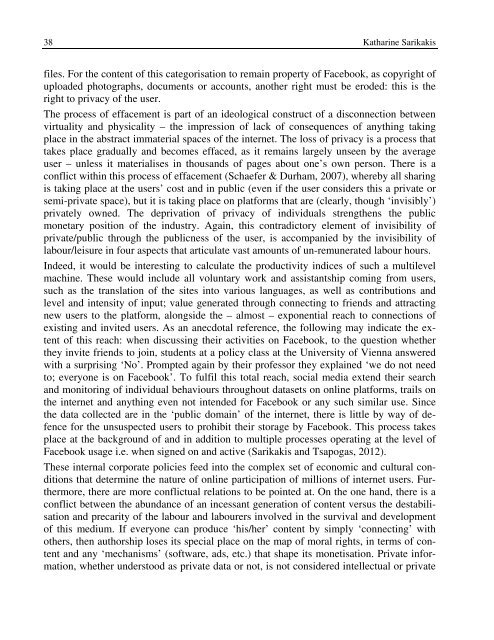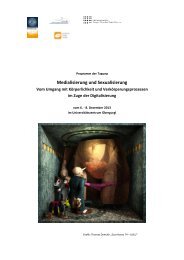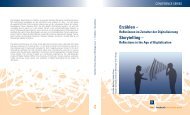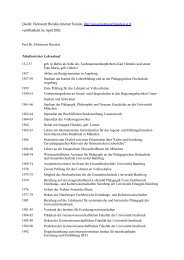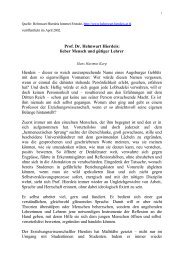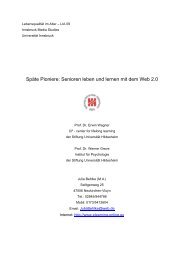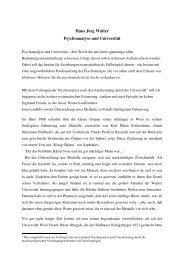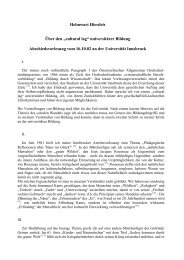Download pdf - Universität Innsbruck
Download pdf - Universität Innsbruck
Download pdf - Universität Innsbruck
Erfolgreiche ePaper selbst erstellen
Machen Sie aus Ihren PDF Publikationen ein blätterbares Flipbook mit unserer einzigartigen Google optimierten e-Paper Software.
38 Katharine Sarikakis<br />
files. For the content of this categorisation to remain property of Facebook, as copyright of<br />
uploaded photographs, documents or accounts, another right must be eroded: this is the<br />
right to privacy of the user.<br />
The process of effacement is part of an ideological construct of a disconnection between<br />
virtuality and physicality – the impression of lack of consequences of anything taking<br />
place in the abstract immaterial spaces of the internet. The loss of privacy is a process that<br />
takes place gradually and becomes effaced, as it remains largely unseen by the average<br />
user – unless it materialises in thousands of pages about one’s own person. There is a<br />
conflict within this process of effacement (Schaefer & Durham, 2007), whereby all sharing<br />
is taking place at the users’ cost and in public (even if the user considers this a private or<br />
semi-private space), but it is taking place on platforms that are (clearly, though ‘invisibly’)<br />
privately owned. The deprivation of privacy of individuals strengthens the public<br />
monetary position of the industry. Again, this contradictory element of invisibility of<br />
private/public through the publicness of the user, is accompanied by the invisibility of<br />
labour/leisure in four aspects that articulate vast amounts of un-remunerated labour hours.<br />
Indeed, it would be interesting to calculate the productivity indices of such a multilevel<br />
machine. These would include all voluntary work and assistantship coming from users,<br />
such as the translation of the sites into various languages, as well as contributions and<br />
level and intensity of input; value generated through connecting to friends and attracting<br />
new users to the platform, alongside the – almost – exponential reach to connections of<br />
existing and invited users. As an anecdotal reference, the following may indicate the extent<br />
of this reach: when discussing their activities on Facebook, to the question whether<br />
they invite friends to join, students at a policy class at the University of Vienna answered<br />
with a surprising ‘No’. Prompted again by their professor they explained ‘we do not need<br />
to; everyone is on Facebook’. To fulfil this total reach, social media extend their search<br />
and monitoring of individual behaviours throughout datasets on online platforms, trails on<br />
the internet and anything even not intended for Facebook or any such similar use. Since<br />
the data collected are in the ‘public domain’ of the internet, there is little by way of defence<br />
for the unsuspected users to prohibit their storage by Facebook. This process takes<br />
place at the background of and in addition to multiple processes operating at the level of<br />
Facebook usage i.e. when signed on and active (Sarikakis and Tsapogas, 2012).<br />
These internal corporate policies feed into the complex set of economic and cultural conditions<br />
that determine the nature of online participation of millions of internet users. Furthermore,<br />
there are more conflictual relations to be pointed at. On the one hand, there is a<br />
conflict between the abundance of an incessant generation of content versus the destabilisation<br />
and precarity of the labour and labourers involved in the survival and development<br />
of this medium. If everyone can produce ‘his/her’ content by simply ‘connecting’ with<br />
others, then authorship loses its special place on the map of moral rights, in terms of content<br />
and any ‘mechanisms’ (software, ads, etc.) that shape its monetisation. Private information,<br />
whether understood as private data or not, is not considered intellectual or private


